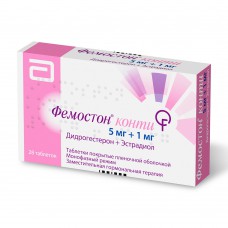Expiration date: 12/2027
Structure and Composition:
Tablets, film-coated. 1 tablet contains:
Estradiol 1 mg
dydrogesterone 5 mg
Excipients: lactose monohydrate, methylhydroxypropylcellulose corn starch colloidal anhydrous silica, magnesium stearate, Opadry Y 8734 Orange (macrogol 400, titanium dioxide (E171), yellow and red iron oxide (E172)
in blister 28 pcs. In the paper cartons 1 or 3 blisters.
Description pharmaceutical form:
Round biconvex film-coated tablets, orange and pink, engraved with "379" - on one side of the tablets and engraved the letter «S» on the badge "7" - on the other side of the tablet.
Characteristic:
Drug for hormone replacement therapy with low-dose estrogen content as a component - estradiol, as the progestin component - dydrogesterone.
Pharmacokinetics:
After oral administration, micronized estradiol is readily absorbed. It is metabolized in the liver to estrone, and estrone sulfate, which is also subject to hepatic biotransformation. Glucuronides of estrone and estradiol are derived mainly from the urine.
Didrogesteron after ingestion is rapidly absorbed from the gastrointestinal tract. Completely metabolized, the main metabolite - 20 digidrodidrogesteron (SDD) present in the urine, mainly as glucuronic acid conjugate. T1 / 2 - 5-7ch, SDD - 14-17ch. Complete excretion occurs within 72 hours.
Description of the pharmacological actions:
Estradiol, which is part of the drug and identical to endogenous estradiol, replenishes deficit of estrogen in the female body after menopause.
Estradiol provides effective treatment for psycho-emotional and vegetative menopausal symptoms, "tides", increased sweating, sleep disturbances, increased nervous irritability, dizziness, headache, involution of the skin and mucous membranes, especially of the urogenital system (dryness and irritation of the vagina, pain during sexual intercourse) . Hormone replacement therapy (HRT) drug Femoston 1/5 prevents bone loss in post-menopausal. Risk factors for osteoporosis in postmenopausal women - early onset of menopause, prolonged use of corticosteroids in the recent past, smoking.
Reception 1/5 Femoston drug alters the lipid profile: reduces total cholesterol, LDL and raises HDL.
Dydrogesterone is a progestogen effective when administered, that provides the phase advance endometrial secretion. Dydrogesterone reduces the risk of endometrial hyperplasia and / or carcinogenesis, increased by the action of estrogen. Dydrogesterone has no estrogenic, androgenic, or anabolic glucocorticoid activity.
should begin immediately after the onset of menopause To achieve the maximum preventive effect of HRT. Effect is manifested throughout the treatment period (the application information estrogen limited more than 10 years).
Indications:
- hormone replacement therapy of disorders caused by estrogen deficiency in post-menopausal women
- prevention of postmenopausal osteoporosis.
Contraindications:
- established or suspected pregnancy
- breastfeeding
- diagnosed or suspected breast cancer, breast cancer in anamnesis
- endometrial cancer or other hormone-dependent tumors
- vaginal bleeding of unknown etiology
- confirmed acute deep vein thrombosis or pulmonary vascular history
- cerebrovascular accidents
- acute or chronic liver disease, including history (up to normalization of laboratory values ??of liver function)
- hypersensitivity to the drug.
Application of pregnancy and breastfeeding:
Contraindicated in pregnancy and during breastfeeding.
Side effect:
Acyclic menstrualnopodobnye bleeding in the first few months of treatment, spotting from the vagina, vaginal candidiasis, pain and engorgement in the mammary glands.
There are - nausea, vomiting, flatulence, abdominal pain, cholestatic jaundice, chloasma or melasma (may persist after discontinuation of the drug), erythema nodosum, rash, pruritus, intolerance to contact lenses.
Rarely - headache, migraine, dizziness, depression, chorea, hypertension, thrombosis, peripheral edema, change in body weight, changes in libido, lower limb muscle cramps.
Drug Interactions:
Drugs that are inducers of microsomal liver enzymes (barbiturates, phenytoin, rifampin, carbamazepine, oxcarbazepine, topiramate, felbamate), weaken the estrogenic effect. Dydrogesterone Interactions with other medicines are not known.
The patient should inform the doctor about the medications that she takes a moment before the appointment or taking the drug Femoston 1/5.
Dosage and administration:
Inside (preferably at the same time of day) in Table 1. a day without interruption.
Overdose:
So far registered no reports of overdose symptoms.
Symptoms may increase the side effects of the drug.
Treatment: symptomatic, there is no specific antidote.
Special instructions:
Before the appointment or renewal of HRT need to collect a complete medical and family history, as well as to hold a general and gynecological examination in order to identify possible contraindications and conditions requiring compliance with the necessary precautions. During treatment with Femoston 1/5 of women recommended to periodically inspect (the frequency and nature of the research is determined individually).
Breast examination and / or mammography is conducted in accordance with accepted standards, taking into account clinical indications.
Femoston 1/5 administered to women who are postmenopausal for at least 1 year.
When switching from other estrogen-progestin HRT reception Femoston 1/5 should begin at the end of estrogen-progestogen phase without a tablet-free interval.
The use of estrogen can influence the results of these laboratory tests: determination of glucose tolerance study thyroid and liver.
Patients receiving HRT and have listed below the state (currently or in the past) should be under close medical supervision: uterine leiomyoma, endometriosis, thrombosis or risk factors in history, hypertension, renal dysfunction, diabetes with vascular complications , bronchial asthma, porphyria, hemoglobinopathies, cholelithiasis, epilepsy, otosclerosis, multiple sclerosis, migraine or severe headache.
Generally recognized risk factors for thrombosis and thromboembolism in patients receiving HRT are thromboembolic events in history, severe obesity (body mass index over 30 kg / m 2) and systemic lupus erythematosus. Regarding the role of varicose veins in the development of thromboembolic events is not generally accepted opinion.
The risk of developing deep vein thrombosis may be temporarily increased with prolonged immobilization, major trauma or surgery. In cases where long-term immobilization is needed after surgery, should be considered a temporary cessation of HRT for 4-6 weeks prior to surgery.
When deciding on hormone therapy in patients with recurrent deep vein thrombosis or thromboembolism treated with anticoagulants, it is necessary to carefully assess its benefits and risks.
If thrombosis developed after initiation of hormone replacement therapy, the drug should be discontinued Femoston® 1/5. The patient should be informed of the need to see a doctor in the event of the following symptoms: painful swelling of the lower limbs, sudden loss of consciousness, dyspnea, impaired vision.
There are data that show a slight increase in the detection rate of breast cancer in women receiving long-term (over 10 years) hormone replacement therapy. Detection of breast cancer may be due to earlier diagnosis, biological effects of HRT, or a combination of both factors. The probability of diagnosing breast cancer increases with duration of treatment and returned to normal after 5 years after stopping HRT.
Patients previously treated with HRT with estrogen drugs only need to be very carefully examined before treatment with Femoston 1/5 to identify a possible hyperstimulation of the endometrium.
Breakthrough uterine bleeding and pronounced menstrualnopodobnye bleeding may occur during the first months of drug treatment. If, despite dose adjustments like bleeding does not stop, the drug should be discontinued until the establishment of the causes of bleeding. If the bleeding recurs after a period of amenorrhea or persists after discontinuation of treatment should be to establish its etiology. This may require a biopsy of the endometrium.
The drug Femoston 1/5 is not a contraceptive. Patients in the perimenopausal recommended to use non-hormonal contraception.
Effects on ability to control the car and other unknown mechanisms.
Storage conditions:
In its original packaging.


